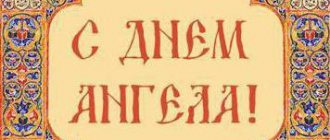"Save me, God!".
Thank you for visiting our website, before you start studying the information, please subscribe to our Orthodox community on Instagram, Lord, Save and Preserve † - https://www.instagram.com/spasi.gospodi/. The community has more than 60,000 subscribers. There are many of us like-minded people and we are growing quickly, we post prayers, sayings of saints, prayer requests, and timely post useful information about holidays and Orthodox events... Subscribe. Guardian Angel to you!
One of the widespread female names in Eastern Europe is the name Julia. There are two possible origins for this name:
- Greek - “wavy”, “fluffy”;
- Latin - “July” or that which comes from the Julian family.
For residents of Scandinavian countries, it is customary to name children born in December after Julia. Christmas falls in this month, and “jul” in their language means this particular holiday.
Julia's name day according to the church calendar - love, family, character
The weightless name Julia arose from the Roman male name Julius.
In the female version it means “fluffy”, “airy”. Belongs to the category of ancient names that are still popular all over the world. Pronunciation of the name Julia in different countries of the world: England - Julius, Germany - Julchen, France - Julie, Spain - Julia, Portugal - Julia, Italy - Julie, Corsica - Dyulia, Czech Republic - Julia, Denmark - Julia, Ireland - Yule, Japan - Hadzeka.
Diminutive form of the name: Yulchonok, Julianna, Yulechka, Julia, Yulka, Yulchik, Yul, Yulenka, Julie, Julia, Juliet.
Fate
Little Yulechka often grows up to be everyone’s favorite and has a friendly, fair character. He likes to play outdoor games with friends, but he knows when to stop, he will never agree to a dangerous game, he will not climb a tree or get into a fight. Parents will not have to worry about their daughter; she will not get involved with bad company even in adolescence. As a child, she learns to read and write early, loves to learn new things, but laziness prevents her from achieving great success. Although Yulia is always surrounded by friends, she is not a leader among them, since she does not like to stand out from the crowd and knows how to adapt to people.
Yulia’s transitional age, to the delight of her family, passes calmly, without strong emotional outbursts. He studies at school averagely, without much success. Good grades can only be achieved in favorite subjects and has the ability to learn foreign languages. Rarely participates in school events due to shyness and reluctance to stand out. She has practically no close friends, because she tries not to let anyone into her soul. Yulechka is always in a good mood, rarely gets irritated and never without reason.
Adult Yulechka turns into a charming and attractive woman. He always dresses with taste, choosing his clothes carefully, loves jewelry, and always has his hair and nails done. He knows how to support any topic with his interlocutor, and can gossip without malice. He does not tolerate rudeness, rudeness, lies, and immediately cuts such people off from his society. Surrounds himself, first of all, with useful people from whom he can benefit. At times she can be overly trusting and can become a victim of scammers.
Career
Not very hardworking, Yulia rarely reaches career heights; work does not come first for her. Throughout her life, Julia can change several jobs, especially if the work is monotonous. Creative professions are more suitable for her, for example, actress, artist, musician, journalist, hairdresser, designer, photographer. Despite her tendency towards laziness, Julia does her work conscientiously and loves to be praised. She has the ability to communicate and smooth out conflicts; she will make an excellent teacher and educator. Thanks to her excellent intuition, she can become an excellent lawyer or psychologist.
Family
Despite numerous love affairs and an army of fans, Julia is in no hurry to get married, as she has high demands on her future husband. She may refuse to marry her loved one, with whom she is head over heels in love and with whom she has been dating for a long time. But because there is some kind of negative in his character that is unacceptable for her list of positive qualities of her future husband. Julia nevertheless finds this ideal man for the role of husband, after which she becomes for him the best wife in the world, economical and caring, able to create home comfort. For the sake of her family, Julia will quit her job without hesitation and become a housewife. Yulechka, who sometimes loves to gossip with her friends, will not wash dirty linen in the family, trying to make everyone think that she has an exemplary family, even if this is not the case. Julia will be a very caring and loving mother to her children, even too much. Julia will do anything for her children, even get a star from the sky.
Source
Holy Martyr Julia of Carthage, commemoration date: July 29, New Age.
She was born into a Christian family. As a child, Julia was captured by the Persians, who sold her into slavery in Syria.
She served her master honestly, but at the same time maintained the purity of Christianity, observing all the commandments. Nothing could persuade her to recognize paganism as the true faith.
When her owner went to Gaul with goods, he took Julia with him. On the way, they stopped on the island of Corsica, where the owner took part in a pagan festival. Julia was on the ship all this time. But the Corsicans gave the merchant some drink, and when he fell asleep, they boarded the ship and captured Julia. She was not afraid to confess herself as a Christian. Having learned about this, the frenzied pagans crucified her on the cross.
The Angel of the Lord informed the monks of a nearby monastery about the death of the martyr. They buried her holy body in their monastery. In 763, the incorruptible relics of Saint Julia were transferred to the monastery of the city of Brescia.
Prayer
Oh, beloved of Christ, wonderful virgin Julia, you endured many sorrows from a small age. Having been in slavery to the tongue, you remained faithful to Christ. She was not afraid of threats and did not succumb to seduction.
Having maintained spiritual and physical purity, standing at the throne of the Lord, help us sinners who ask for your help to maintain purity and chastity. Having been tormented by evil tongues, you suffered until death. Deaths on the cross.
Pray to the All-Merciful Savior to strengthen our faith and to send us patience in our sorrows! Having received grace from God to bestow healing on the sick, do not despise us sinners who ask for your help. Give us healing in our ills.
Rejoice, great wonderworker, martyr Julia! Lamb of Christ, pray to God for us! Amen.
Martyr Julia of Ankyra (Corinthian), memorial date: May 31, New Age.
Her life is associated with the martyr Theodotus and seven virgins - martyrs Tekusa, Faina, Claudia, Matrona, Alexandra and Euphrasinia. They all lived in the third century in the city of Ancyra.
Saint Theodotus was married at that time and had his own hotel. Despite this, he lived in purity and wherever possible he led people to Christianity with his conversations. From the Lord he received the gift of healing.
Many people fled the city, abandoned their homes and farms. Famine reigned in Ancyra. Saint Theodotus sheltered many Christians in his hotel. The Divine Liturgy was also celebrated secretly here.
Relics
According to one legend, the body of the martyr was discovered by the monks of the island of Gorgon and buried in their monastery. Before this, an angel appeared to them and told about the girl’s suffering and her feat for the sake of the faith of Christ.
Much later, the holy relics were transferred to the city of Brescia in northern Italy. Every year thousands of believers come here to venerate Saint Julia of Carthage and ask for help. Here you can also purchase icons of the martyr. According to the clergy, she is the patron of mothers and sick children.
Julia's name day according to the church calendar
Every year Orthodox people celebrate name days. According to the church calendar, the Day of Remembrance of the Holy Patroness Julia is celebrated several times a year.
In common people, name days are also called Angel Day, although there are differences between these days.
Name days are celebrated on the day of remembrance of the Patron Saint, and Angel Day is the day of receiving the Sacrament of Baptism. Orthodox believers attach special significance to these days - just like on their own birthday, they try to confess and take communion, so that the holiday is not only physical, but also spiritual, from unity with the Lord.
Reverence
The Corsican martyr of Nonza has been revered since her brutal murder. For this purpose, a sanctuary (or sanctuary) was built near the city. However, in 734 it was destroyed by barbarians. In addition, holy springs are open on the island, to which local pilgrims flock with requests for healing and protection.
Saint Julia's Day is celebrated annually in Corsica. The martyr herself, according to the decree of the Sacred Congregation of Rites of August 5, 1809, is considered the patroness of the island.
In the Orthodox Church, the feast day of St. Julia is considered July 29 (new style).
Angel Julia Day
So, every person’s Angel Day can happen on any day. Everything will depend on when, in childhood, the child was brought to church to be baptized by his parents.
Believers try to adhere to the ancient tradition of baptizing a child on the 40th day after birth. But some people receive Holy Baptism as adults. So, people with the same names can have their name day on the same day, but Angel Day almost never.
When is Julia’s name day according to the church calendar?
When choosing a name for a child, believing parents themselves choose his Patron Saint. As a rule, this happens even before the baby is born. Parents pray to the Saint, whose name their daughter or son will bear, so that the pregnancy is successful, the birth is successful, and then all their lives they ask the Saint for intercession, protection, and wisdom in raising a pious Christian.
If an adult does not know who his Patron Saint is, he can choose his own Intercessor. This is done simply. For example, an adult girl with the name Julia opens the Orthodox calendar and sees that the name “Julia” is not in the Saints, but there are Saints with the names Julia and Juliania.
The girl reads the lives of all the Saints she can find and chooses the one that is closest to her liking. And then her task will be not only prayer and requests for help in various matters to the chosen Saint, but also veneration - on the days of remembrance you need to attend church, confess and receive communion.
For believers, it is natural to turn daily to their Guardian Angel and Patron Saint in prayer.
Characteristics of the name Julia
First, you need to understand what the name Julia conceals. The main advantages include:
- sociability;
- developed intuition;
- Creative skills.
Women with this name are characterized by constancy in mood, but at the same time vulnerability and touchiness.
.
Julia often gets into an argument and rarely admits her guilt or mistake. But they are also sensitive and merciful
.
Bearers of the name are very happy in marriage. For her, family becomes the meaning of life. She has an excellent relationship with her husband; quarrels are a rare occurrence in her house. The housewife from Julia is wonderful. She not only cooks well, but is also very hospitable. She is a good friend who will support you in difficult times and share your joy.
.
Many Yulias love to read
. He strives to attract all family members to this hobby.
She doesn’t prefer to talk about herself, while she is an excellent listener. The disadvantages include:
- secrecy;
- caution;
- moodiness;
- uncertainty.
The employee from Yulia is very efficient and correct
. If the profession corresponds to her calling, then she will prove herself one hundred percent in it.
Holy Martyr Julia of Carthage, Corsican
Memorial Day is July 29. Several centuries after the Nativity of Christ, the Great City of Carthage was once again treacherously captured and completely destroyed with pagan cruelty. Residents of the city were captured, among them was a small, innocent girl, Julia, ten years old.
In the general mass of people, forced by the pagans, walking far from their places of residence, Julia could not find her parents, friends, neighbors, tears literally consumed her childish face, when suddenly she heard the voice of God: “Blessed are those who mourn, for they will be comforted,” and she calmed down . The girl herself and other captives were taken to Syria, where everyone was sold into slavery. Julia tried not to think about home, prayed a lot and did her work carefully.
Interesting Facts
The city of Sainte-Julie in Canada, Quebec, is named after Saint Julia of Carthage. An asteroid that was discovered in 1866 is also named after her.
In the Orthodox tradition, another martyr named Julia is venerated. She is one of the seven holy virgins who were drowned in the lake after cruel torture for the faith of Christ. Later their bodies were burned by the pagans. The saint is called Ancyra (or Corinth) after her place of birth. Her memory day is celebrated on May 31 and November 19 according to the new style.
In the 7th-8th centuries. The church at the burial site of the martyr fell into disrepair and was partially destroyed. The inhabitants of Corsica decided to build a new temple in honor of Saint Julia. They collected stones, sand, bricks and left them in the place they chose to erect the building. But on the night before the foundation was laid, someone’s invisible hand carried all the materials to the foot of the old church. Perplexed, people returned everything to a new place. But the next night the same thing happened. According to legend, watchmen watched as the bright maiden transported materials on white oxen. People realized that Saint Julia did not want the temple to be built in a new place. Therefore, the place of her burial was cleared and a new church was erected in honor of the martyr.
Holy Martyr Julia of Ancyra (Corinth)
Memorial Day is May 31st. The biography of the holy martyr Julia of Ancyra originates in the city of Ancyra (now the territory of Turkey) at the turn of the second and third centuries.
A tough pagan ruler, Theotekn, was appointed to Ancyra, whose main command was that Christians accept pagan sacrifices; in case of refusal, pagan heralds plundered the homes of Christians and destroyed the latter.
At the moment, in Orthodox circles it is believed that the icon of Julia of Ankyra and a prayerful appeal to the martyr herself will protect from physical violence. There is also a temple of Julia of Ankyra in the Moscow region.
Another version
According to the second version, which is also welcomed by the Corsicans, Julia was a native of the city of Nonza and a contemporary of Saint Devota (about 303). For refusing to bow to pagan idols and sacrifice to them, the girl was tortured and then killed. They cut off both her breasts and threw them off a cliff. In the place where they fell, two healing springs opened. After this, the enraged executioners tied Saint Julia to a fig tree, where she died in pain. At this time, a dove flew out of the maiden’s mouth. This moment exactly repeats the previous version of the life of the martyr.











